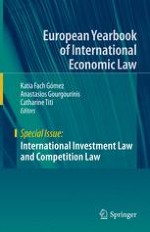
2020 | OriginalPaper | Buchkapitel
Quest for a Sustainable International Investment Regime: Leveling Up Through Competition (Policy) Rules?
verfasst von : Friedl Weiss
Erschienen in: International Investment Law and Competition Law
Verlag: Springer International Publishing
Aktivieren Sie unsere intelligente Suche, um passende Fachinhalte oder Patente zu finden.
Wählen Sie Textabschnitte aus um mit Künstlicher Intelligenz passenden Patente zu finden. powered by
Markieren Sie Textabschnitte, um KI-gestützt weitere passende Inhalte zu finden. powered by